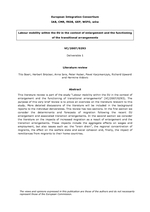Labour Mobility Study
Labour Mobility - Background Analyses - Brain drain, brain gain and brain waste
Agnieszka Fihel, Pawel Kaczmarczyk, Anna Sylicz and Nina Wolfeil
in: Labour Mobility - Background analyses
Labour Mobility Study ,
Despite a rapidly growing scholarly interest in skilled migration generally, there is as yet only limited evidence on the extent and effects of the outflow of skilled workers from the New Member States (NMS), the so-called "brain drain". Economic theory predicts that a brain drain can have positive or negative impacts on the sending country, and so any assessment of the actual effect remains but an adverse impact of skilled migration upon the sending country cannot be ruled out a priori. The assessment of its effects becomes an empirical issue. Drawing robust conclusions from the empirical evidence is difficult, partly because of severe data limitations, but it is important because the lack of evidence is matched by a widespread popular perception that skilled migration represents a significant economic problem for NMS.
The aim of this report is to provide an assessment of the scale and impact of highly skilled migration from the NMS. We draw mainly on Labour Force Surveys from each of the EU27 countries in 2006. The statistical analysis confirms that migrants from the NMS are positively selected with respect to education. This education differential is not simply that the result of differences in the age structure. However, claims about the size of the outflow of skilled workers may have been overemphasized. With regard to the impacts of highly skilled migration, we refer to both static effects (drain effect) and dynamic effects (brain effect). We show that the drain effect is rather limited and, at least in case of Poland, the most important sending country, recent mobility is to be understood in terms of brain overflow resulting from an oversupply of highly skilled labour. The brain effect, however, also appears to be limited, mainly due to the relatively low rates of return to human capital observed in main destination countries.
Countries covered: European Union, New EU Member States
Research Areas: Labour, Migration and Income Distribution
